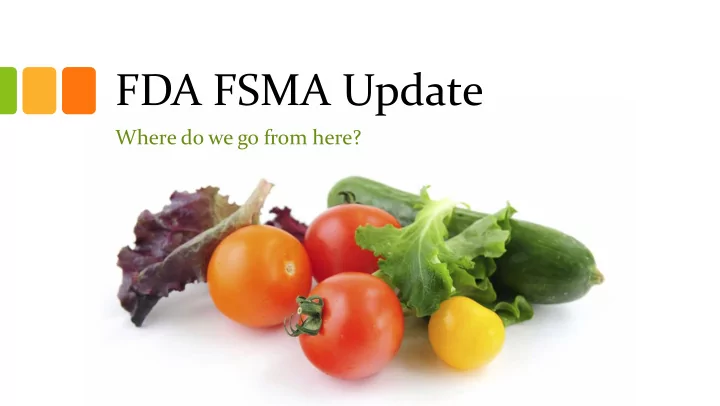

FDA FSMA Update Where do we go from here?
Exploring FSMA’s impact so far… • 1 in 6 Americans get sick • 128,000 are hospitalized • 3,000 die each year Since enacting FSMA, the incidents of recalls have increased 92.7% according to FDA’s own statistics. In this session we will the explore impact to your business of the FSMA rules, changes at the agency and the advancements of technology to help solve for the challenges that FDA’s intent of the rules; food safety and transparency.
FDA Partnerships • Department of Justice (DOJ) – Announced Partnership with FDA – Adopted a policy of initiating criminal investigations against any company (or its employees) that sells a product that cause human illness. FDA DOJ • Principal Deputy Assistant Attorney, Benjamin C. Mizer – “FDA and DOJ view any human illness caused by a food product as a potential violation of the law.”
What consumer action groups are saying Shift from deferred prosecution and large fines to individual criminal and civil liability for executives, officers, employees Goal is to target individuals higher up the corporate hierarchy early in an investigation, includes civil actions against individuals who may not have the necessary financial resources or pay a significant judgment
Food supply challenges ❑ FDA reports that since the FSMA rules released, recalls have increased 92.7 percent ❑ Significant losses in food perishable product are incurred due time, temperature and inventory. ❑ In 2017 U.S. Department of Agriculture Reported that 40% of food is wasted in our oversees meat production, reports supply chain. recalls jumped 83.4% in the same period ❑ Bloomberg reports that food fraud costs are up ❑ Recalls can take up to two weeks to track to $40 billion every year – Food Authentication in the supply chain with the average recall costing $10M. ❑ Salmon Example: Oceana Reports that 43% of Salmon fish is mislabeled. Additionally 69% of ❑ Major recalls in 2018 were with Romaine the wild-caught Salmon was actually farm Lettuce and Ground Beef. At one point raised. FDA advised not to consume lettuce.
Agencies using FSMA rules for enforcement Temperature controlled transport company pays State of California $19.4M in a settlement Another Transport Company was court sanctioned for FDA oversight for services. According to the order, ranging from $89.35 to $107.09 per hour. The company also must pay all costs of: • Supervision • Inspection • Investigations • Analyses • Examinations
Sanitary Transportation of Food impact on fleets FSMA includes new sanitary transportation operational practices will impact refrigerated fleets:
Sanitary Transportation Roles SHIPPER THE ONE WHO INITIATES THE LOAD THE ONE WHO PREPARES FOR TRANSPORT AND LOADER LOADS TRAILER 1. Identify Hazard THE ONE WHO PHYSICALLY MOVES CARRIER THE FOOD BY MOTOR TRANSPORT THE ONE WHO RECEIVES LOAD AFTER RECEIVER TRANSPORT
Preventative Controls Inspections Average 400 Full @Facility 3 – Inspections 7days #1 Hazard Food Facilities 50% Receive Target 483 Citation #4 Safety Plan
Sanitary Transport Inspection 133 Food Inspections Facilities Enhanced PC Focused on Noted focus Inspection Shipper on Receiver
Industry Walmart utilizes Blockchain technology to track and trace mangos as a proof of concept
In 2018 Frank Yiannas, Walmart, VP Industry of Food Safety mandates the first blockchain in retail for lettuces suppliers
FDA’s New Commissioner Food Policy & Response Former Walmart VP of Food Safety takes on top job for food policy at FDA.
Insights; Frank’s Twitter Account
FDA’s 2020 Budget Request “ In recent years, we’ve seen emerging track and trace technologies that can assist response efforts to allow the FDA to intervene in time to alert consumers, implement recalls, and avoid human illnesses. This includes blockchain technology.”
Why Blockchain Blockchain is a shared, distributed ledger that facilitates the process of recording transactions and tracking assets in a trusted business network. Variabilities Current Data Systems ❑ Single point attack – change data for all ❑ Requires data validation entry/exit ❑ Added layers of expense ❑ Data limited to ecosystem
Blockchain; The Future Of Food Supply Chain Blockchain is a shared, distributed ledger that facilitates the process of recording transactions and tracking assets in a trusted business network. Temp. Controlled Temp. Controlled Temp. Controlled Transport Transport Transport Transport Consumers Farmers Food Processors Wholesalers Distributors Retailers/ Restaurants/ FSO
Digital Convergence Connected Company There Will be 20.4 Billion IoT Devices by 2020 Connected Employee Connected Asset Connected Consumer Connected World
Understanding your role within FSMA ➢ Understand your role within FMSA rules The first Deputy Commissioner and the third Deputy Commissioner ➢ Start engaging technology ➢ Develop FSMA strategies “The key... is that the new law explicitly places primary responsibility for food safety -- for prevention -- on food producers and processors,” Taylor said. (Former FDA Deputy Commissioner for Foods, Michael R. Taylor)
Resources GCCA STF Refrigerated IBM Blockchain Guide Transportation Best Practices Guide Don Durm 407-252-6036 @dondurm_speaks @don-durm
Recommend
More recommend